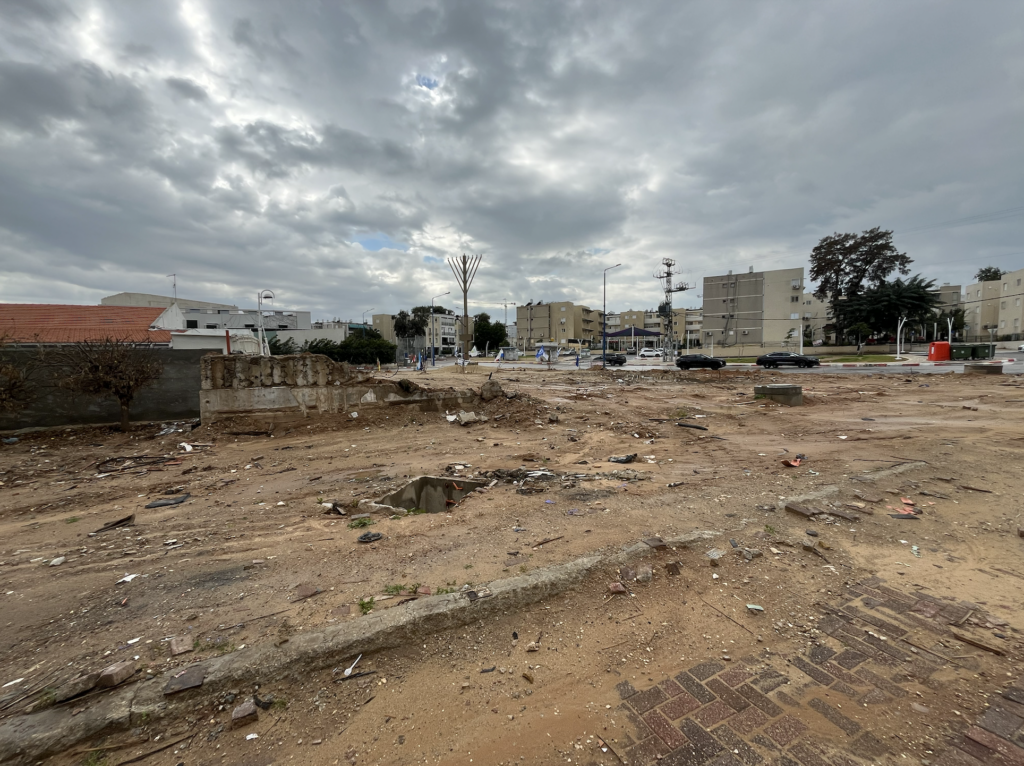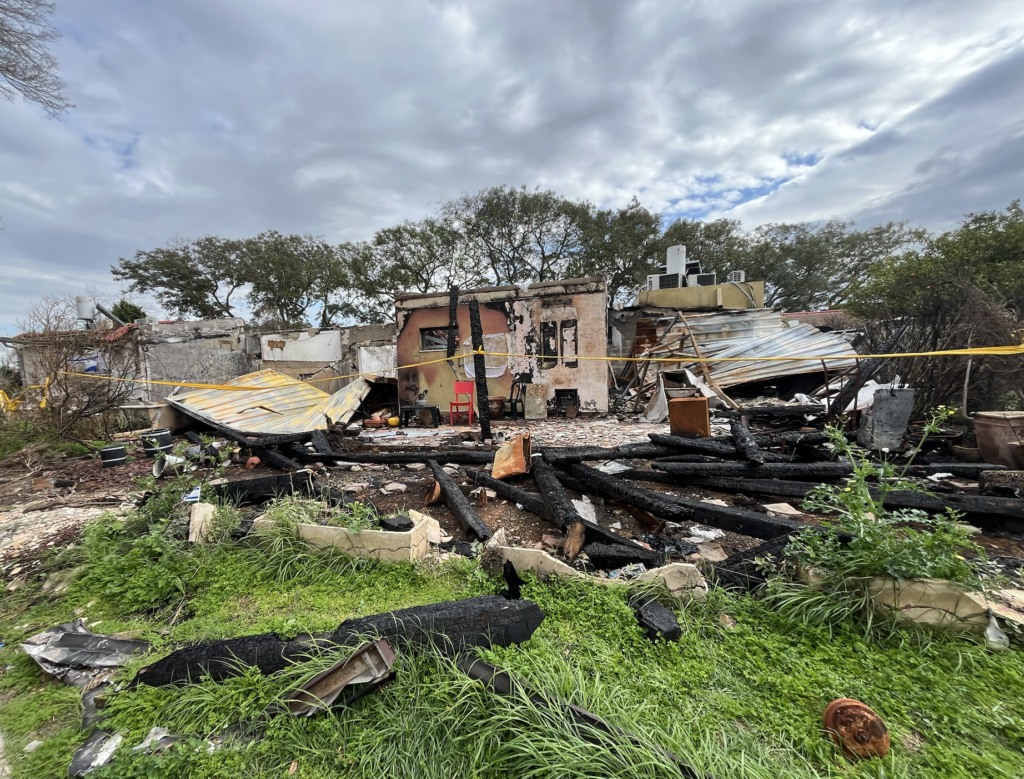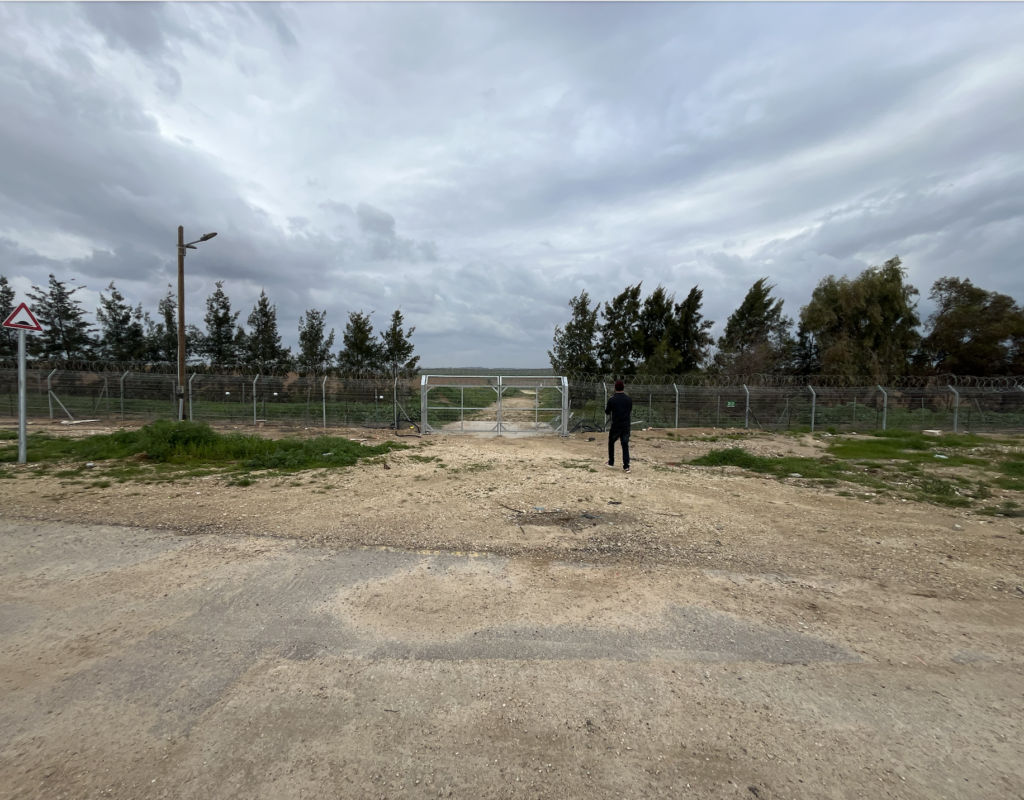“I can’t believe we are going to the place where the most horrible thing happened, and it’s an hour from here,” says Yael.
“When it started, we were like, ‘Holy shit!'” says Avi. “Then we got used to it.”
Avi continues driving south, Tel Aviv to Sderot, a spot most individuals grew to become conscious of on October 7. The movies of white pickup vehicles arriving on a Saturday morning had been unremarkable however for the lads within the again with assault rifles. We might study some additionally carried cameras, with the intention to memorialize what that they had come to do. As one headline later learn, “Everyone died.”
“This is where the police station was,” says Avi of a dust lot punctuated by an air conditioner–dimension shaft. In any other case, there isn’t any signal of latest habitation, no commemoration of the hours-long firefight up stairwells and on the roof. Seven officers from the station and an untold variety of Hamas militants had been useless by the point the Israeli navy gave the order: Hit the station with tank hearth.
“There was one terrorist left in the building,” Avi says. “Israeli forces demolished it, with him inside.”


“We tend to raze things,” says Yael, as she and Avi transfer up what was as soon as a busy business strip. Each wall right here is pocked with bullet holes, damaged window glass has not been changed, and what seems to have been a residence is lacking its face, exposing a toppled-over sink and a pile of garments. The one two different folks on the road make assurances that the blood from the 50 civilians killed right here on October 7 has all been washed away. Nonetheless, the city feels ghosty, deserted. Life and dying are frozen right here, if not a mile away in Gaza.
“They’re from Israeli cannons,” says Avi of the booms that make folks cease and lookup, or what folks there are: Ninety % of Sderot’s 40,000 residents fled after the bloodbath, and fewer than 15,000 have returned.
“All seven of the dead cops used to eat here,” says the proprietor of a shawarma cafe, the one store within the neighborhood that is open. “Every day we hear about another customer who is dead.”
“We were home watching the TV when it happened,” says his spouse, who heard the gunshots and screams on October 7 however refused to imagine it was occurring.
“I closed the window,” she says. Her husband opened it, they usually did this a number of instances till they left Sderot that day, coming again solely after three months.
“It’s the first and last time I’m ever leaving. I won’t let Hamas win,” says her husband, including that the proprietor of the sporting items retailer subsequent door went out for a jog on the morning of October 7 and was murdered.
Avi will get again on the highway, the identical highway the place a whole bunch of younger folks ran for his or her lives and deserted their automobiles and had been slaughtered on the spot or marched at gunpoint into the white pickup vehicles.
“We were sleeping, a deep, deep, deep sleep,” he says of what’s self-evident: that Israel was unready for the assault; it had change into complacent, even hubristic, trusting an excessive amount of in its intelligence and the Iron Dome.
“How many people hid here in the trees and played dead?” Yael asks as they go fields thick with banana, lemon, and avocado bushes. There may be regular site visitors at this time, no signal of carnage.
“Unbelievable,” Avi says below his breath, seeing military vehicles guarding a newly secured space, which might by no means have been the case earlier than October 7. The Nova pageant was a rave in an avocado grove, for God’s sake. Scanning for one thing to be glad about, Yael factors to some tiny crimson flowers poking up by the mud.
These will transform the one glad issues for the subsequent hour, or nonetheless lengthy it’s folks keep on the memorial of 364 useless younger folks, who haven’t any alternative however to remain right here, to be remembered at or close to the place they had been shot, stabbed, bludgeoned, burned. It is tempting to say that is the worst factor, and it’s the worst factor. However there are different worst issues, together with, one imagines, being requested to provide a photograph of your useless daughter, to characterize every thing and love about her. This photograph will probably be affixed to a put up and sunk into the filth. Will probably be adorned by you, maybe by others, with the same old totems: flowers, candles, aphorisms. It’s possible you’ll search to make it private, as you may see others have achieved for his or her murdered family members, with a scrunchie, a keyboard, a karate medal. However the query is, how do you decide the photograph? Is it the certainly one of her at age 5, palms held into anticipatory fists as she stands over a plate of cookies? Is it the highschool commencement? Is it the latest one, onstage accepting an award, her hair shining like a mirror and the lifetime she’d put into deserving that award making her glow? And in case you can resolve, how do you allow her in that discipline alone? How do you not curl your self across the pole each evening and say, “Just leave me here. I’ll stay here.”
Avi and Yael metal themselves for the subsequent cease, a spot, if not worse, then in another way dangerous: the kibbutz the place Hamas and others from Gaza breached a fence on October 7, killing 63 folks and kidnapping 18 others.
“You have 10 seconds to find shelter should we hear an alarm, to either run to a safe room or lie on the ground with your hands over your head,” says Ron, the younger feminine IDF officer giving a tour of kibbutz Kfar Aza, now emptied of its 950 inhabitants. Grapefruits the scale of soccer balls rot on the bottom, kids’s bikes lie deserted in play yards that includes miniature camel collectible figurines, and yellow tape surrounds the worst of the October 7 kill websites, some marked with coloured symbols: blue means a bomb squad has cleared the home, a quantity in crimson signifies what number of our bodies had been discovered inside. Ron assures guests that “any body parts are gone and even the birds have come back.”
A bougainvillea grows outdoors the house of a newlywed couple who had been burned alive of their protected room. The cycle of nature rising over, of therapeutic and forgetting, appears each hopeful and obscene.


The air smells of burnt wooden and one thing else: gunpowder.
An indication reads, “Human remains on couch.” At Kfar Aza pic.twitter.com/LsRenwj07c
— Nancy Rommelmann (@NancyRomm) January 28, 2024
Avi approaches the fence the place the terrorists poured by and the place, in keeping with Ron, they poured again out with what loot they might: flat-screens and cellphones and footwear taken off the ladies that they had simply murdered.


“We knew everything about everything, but we didn’t know about that,” Avi says, which means the navy planning Hamas was able to, in addition to how a lot they had been keen to threat with the intention to slaughter their neighbors, dangers that, greater than three months later, reverberate each jiffy with the bombing of Gaza by the Israeli forces creating what Avi calls “the symphony of war.”
Strolling again to the automotive, he and Yael hear one other be aware of the symphony, the muffled “pop” of the Iron Dome intercepting a rocket coming in from Gaza. Yael appears to be like on the streaks it makes within the sky, thinks to remark, after which, doesn’t.

